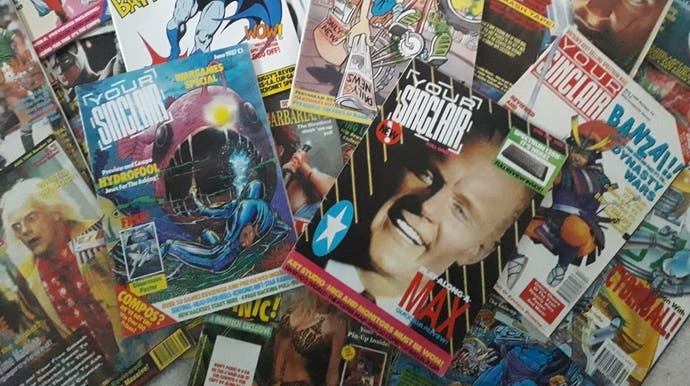The story of Your Sinclair
Read this article. Or we'll put the frog in a blender.
By the early 90s, the ZX Spectrum appeared hopelessly outdated. The Commodore Amiga and Atari ST were appreciably better computer alternatives, while those with a pure penchant for video games would shortly be able to get their hands on a Super Nintendo Entertainment System, if they hadn't already invested in a Sega Mega Drive. In terms of graphics and sound, all of them were ridiculously better than the Sinclair machine. I wasn't really playing on my 128k +2 Speccy much as I looked on enviously at Mega Drive screenshots of Strider and Golden Axe; but what I was still doing was consistently reading Your Sinclair each month, often to the scorn of friends and family. "Why are you still reading that?!" they would clamour. "Because," I'd reply with a tone of calculated indifference, "It's funny."
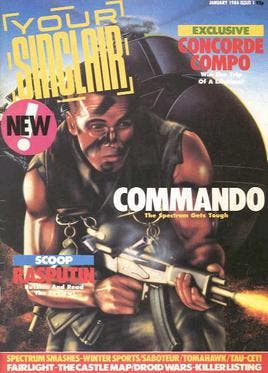
Your Sinclair began life as Your Spectrum, and it wasn't just the name that was different - practically everything inside was, too. "It was a long time ago, and Dennis Publishing was a very different company - actually called Bunch Books at the time," says Roger Munford, launch editor of Your Spectrum back in 1984. As with its peer, Sinclair User, Your Spectrum focused on many of the serious aspects of computing, with gaming taking its place among features on programming, hardware and the business uses of the Sinclair microcomputer. The aforementioned rival, not to mention Newsfield's Crash, helped instigate the change to the magazine ZX Spectrum fans know and love today. "The Spectrum was no longer the focus of all that Sinclair were doing," continues Munford. "They had launched the QL, and also that silly electric car. The title change was more hoping that Sinclair was going to be like Apple, and also to pit the magazine more clearly against EMAP, which had the clear winner in the field."
Issue One of Your Sinclair hit newsstands at the end of 1985, sporting a gritty Commando cover and a cassette on its cover, containing a demo of the isometric puzzle game, Rasputin. With Munford having departed the magazine to help launch MacUser, Kevin Cox took over the reins, and he oversaw a tense period as the material graduated towards games and entertainment, relegating much of the technical and business-like content to a handful of pages at the back. Already at Dennis publishing since the days of Your Spectrum, Teresa Maughan, nicknamed T'zer, was deputy editor on this shining new publication that was determined to evoke youth magazines of the time rather than its fellow computer games monthlies.
Maughan begins our interview with a troubling admission. "I joined Bunch Books as it was at the time, around 1984," she says, "and when I started I was production editor on Your 64." Your 64? A...a commie mag? "Yep! There was a Commodore 64 at the flat I shared, so I piddled about on that. I wanted to work in TV originally - I basically wanted David Attenborough's job - and even wrote him a letter, asking him how he got into it. I actually got a really nice handwritten note back from his home address, but still ended up in magazines!"

Safely transferred across to Your Spectrum, Maughan became deputy editor, below Kevin Cox and Stephen England as publisher. In came the T'zers column, complete with industry gossip and cheeky asides, cartoons, a massively-increased reviews section, comic strips and a significant lack of boring technical writing. "There were some purists who didn't like it," notes Maughan, "and we got a few letters from people who just wanted to read about hard drives. But the market was going more towards games, and as the circulation clearly went up, we were obviously appealing to a broader section of fans. It was tough luck, but there were other magazines for those people, like Sinclair User, which was really quite boring!"
But it was much more than the absence of Microdrive roundups and long listings of numbers and obscure characters that marked the change from Spectrum to Sinclair. The style of Your Spectrum had already begun subtly changing; now the shift to a more casual quality began in earnest. "We wanted to make the readers feel part of Your Sinclair," Maughan says. "So we felt it was important the magazine had a voice, as did each writer, along with a personality. It was all very deliberate, to make the readers feel included." This tone, ripped from the pages of teenage magazines such as Smash Hits and Just Seventeen, was further demonstrated with the cassette that sat on the front cover, an extremely unusual event in 1986. The idea was simple: every now and then, sales would begin to sag, and need a boost thanks to a timely cover mounted gift. With the monthly figures improved thanks to the added value, circulation would be closely monitored for when the next gift was due.
Also working on the inaugural issue of Your Sinclair was Phil South, who had joined during the early days of Your Spectrum. "I came over from Argus Press with Kevin Cox, and wanted to write about video games, even though I didn't have a computer! I used to just look at the wrappers and imagine..." Like Maughan, South considers Your Sinclair's forebear to be a little on the, well, boring side. "[Your Spectrum] was very much like Sinclair User, very techy and trainspottery, and a little bit dry. In fact, it was as dry as old toast! Kevin brought me in to make it funnier, then they relaunched it, and his vision was to make the computer version of Smash Hits. Kevin was an old school newsman, but the rest of us were not very serious people, so it went uphill or downhill from there, depending on your point of view."
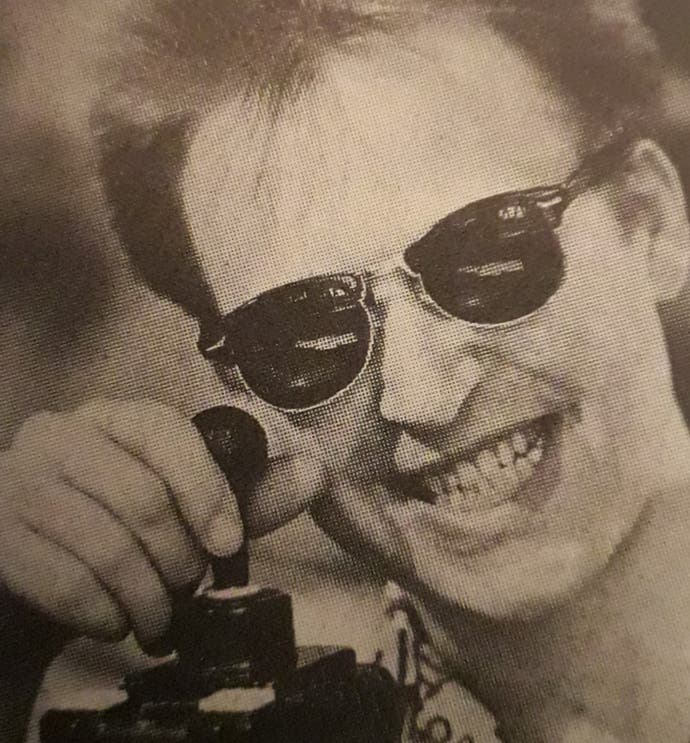
Despite the purgatory that was magazine production in the early-mid 80s, Maughan enjoyed her role as deputy editor, with her T'zers and Agony Aunt columns proving a good release for her creative side. "As a production editor, I'd had to read through all the copy and proof it, making sure it all fit and so on. It was a natural progression [to deputy editor] as I was quite creative and used to like writing a lot. The agony aunt was particular fun, a pisstake of Marjorie Proops. When we first did it, we made stuff up like 'I can't get a girlfriend', but then we got loads of people writing in." Your Sinclair's rapidly bulging popularity and unique voice to each of its readers soon paid dividends - unless you were their local postie. "We used to get thousands of competition entries, letters, cartoons and more, and I did get some odd things sent in sometimes. I remember opening an envelope once and glimpsing some cut nails and a bit of hair in it. You'd probably report it today!"
The success of Your Sinclair meant an inevitable promotion for its editor; in 1987, Kevin Cox became publisher of the Speccy magazine with Teresa Maughan moving up to editor, beginning another legendary chapter of the UK's most bonkers computing magazine. "The style of Your Sinclair made it very fun to edit, and we continued to get a lot of inspiration from teenage mags," says Maughan. "We took the view that our audience liked games, but that didn't mean they were nerds. As soon as we took that stance, we asked what else they'd be interested in, and as our readers were predominately teenage boys, we concluded that there should be more toilet humour."
As a 24-year old woman you might think that Your Sinclair's new editor would have found this direction tricky. "But actually, it didn't seem that difficult to understand, plus I was surrounded by a team who, while the same age as me, acted like teenage boys!" The spirit of this was exemplified in the games reviews, written by a team of freelancers and staff writers such as South. "We used to play the game and have a core of an idea about it, which we'd slip into the review at some point," he smiles. "And then we'd basically write two hundred words of jokes, me and Berks throwing one liners back and forth before slipping in what we thought of the game."
The relationship between South and Marcus 'Berks' Berkmann was a good example of how the editorial team would generate the humour in the mag. "We'd read stuff out in the office, bouncing ideas off each other," Maughan remembers. "Somebody would say something really ludicrous, you'd egg each other on, so things got really outrageous, which wouldn't normally happen alone, but in a group of us we found funny. We hoped other people would, too."
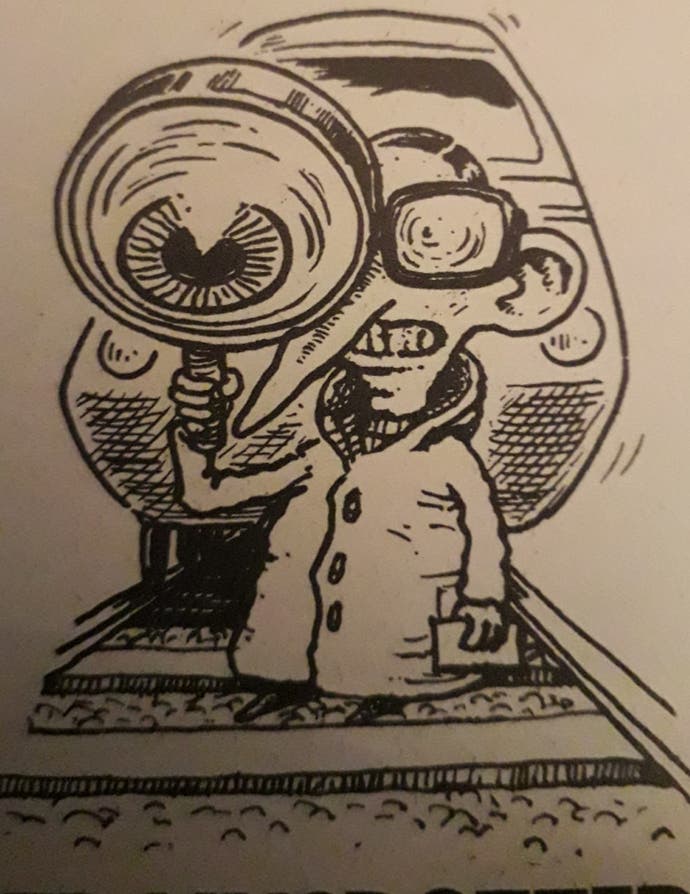
The humour was everywhere. In the letters pages ("You don't need to tell me about the supernatural effects of Your Sinclair - I fixed my washing machine with the October issue"), in the reviews ("When they made Stallone, they threw away the mould, unluckily it bounced, got bent around a bit and out of it sprung Butch") and editorial sections. A healthy obsession with geeky trainspotters continued, presenting numerous celebrities in nerdy soliloquies, with Michael Caine one of the most memorable. "'Ere, do you know that flies take off backwards? It's funny, but I fort me trousers were acting strangely," 'said' the famous actor in the May '87 issue. Readers could become trainspotters themselves by pointing out mistakes in the magazine, with a coveted Your Sinclair Trainspotter Award the prize. Even politicians came under the withering gaze of Your Sinclair, with Norman Tebbit's Dead Serious Corner featuring within the letters pages. It was all part of the fun.
And it was the people behind Your Sinclair that made it popular, the real characters, and the not-so-real. Treading a fine line while working for rival magazine, Crash, John Minson in particular wrote under several pseudonyms, even going so far as creating a romance between two of his characters. For readers sending in letters of affection to the love-struck pair of Gwyn Hughes and Rachael Smith, there was to be no hope of a reply, at least not from them in particular. Even Munford had got in on the act, creating the female persona of Sue Denham for the earlier issues. But there was a very real chemistry happening, including a lark-filled bromance that straddled the twin obstacles of geography and class. "Being a working-class kind of chap, I used to hop out every now and then to get some fags," recalls South warmly, "Berks, being an upper class sort, for fun called me Snouty, everyone laughed and it stuck. Yes, there was a culture clash initially, I thought he was such a stuck-up toff and would never fit in when he joined. But we realised that we were very alike, and shared the same sense of humour, becoming the best of friends. It didn't actually matter where we came from."
South laughs when I ask him how many lunchtimes were spent down the pub with Berkmann, Maughan and the other members of the Your Sinclair team. "Ha, every lunchtime! I got hired in a pub, celebrated in a pub and subsequently spent every day of the magazine in the pub." Near Dennis Publishing's offices on Rathbone Place was an establishment known as The Wheatsheaf. "It became an extension of the office. Not a great deal at lunchtime, but God we drank a lot in the evenings. It'd kill me stone dead today!"
As deputy editor, Maughan would have the added bonus of PR junkets and boozy lunches hosted by software houses. "I remember going to a PR thing on a boat once, and by 11am we were all drinking Buck's Fizz and champagne - that was fairly normal when a game was being launched. I don't recall much else about that day other than sitting next to Willie Rushden and him bumming a cigarette off me!" Another time, after her promotion to editor, Maughan was invited by BT's games division, Firebird, to a restaurant in the city. After a meal buttressed with vodka and orange, red wine and flaming Sambucas, she returned to the office and promptly fell asleep, before waking up around 6pm. And then going to the pub.
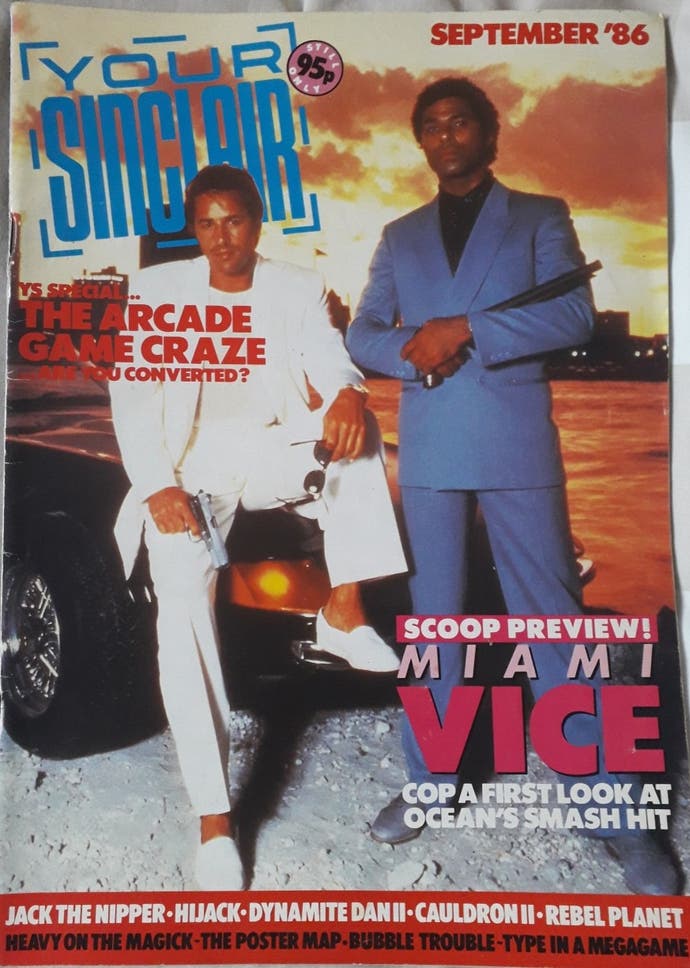
1987 had been a fine start to Teresa Maughan's turn as Your Sinclair editor. "There were all these people I gave jobs to that you probably wouldn't normally, but I very much believe in giving people a break," she reveals. "Take Duncan McDonald, for example. He was completely crazy, and probably one of the most talented people I've worked with. But he would be so unreliable, pitching up to the office around 1pm and working until 2 in the morning. And David McCandless - Macca - he was a reader who just kept writing letters in until I invited him in to do some work experience."
Having bedded in during 1987, Maughan decided to push the boat out further the following year, making the humour more daring and the covers more outrageous. "Kevin was quite daring," says South, "but Teresa was ever-so-slightly-more daring. I actually thought the covers often went too far: she'd show Berks and I the next one and we'd be like 'Fucking hell, is that allowed?'.
Beginning with January 1988 and its blood-stained He-Man sword, Your Sinclair celebrated Martech's Vixen not just with a pin-up poster of its star, page 3 model Corinne Russell; brazenly front and centre was also the buxom lady, instigating a swathe of angry parents on the letters pages, with the blood-soaked pig on the June 88 cover and flying teeth and eyeballs of October 1988 doing little to dissuade the distressed mothers. Even a tie-in giveaway of Viz comic, adapted for a younger audience, drew criticism. But most importantly, sales remained strong - the format was clearly working. "I took the view that I just thought about my audience who were predominately teenage boys," notes Maughan, "Plus we wanted a magazine that was pushing the boundaries, and a bit edgy and exciting. That was all deliberate, and, yes, we did get a lot of letters from parents. Oh well..."
With Your Sinclair's excellent relationship with many of the software houses resulting in some fine exclusives on its cover mounted cassette tapes, Maughan began looking ahead by the end of 1988. Her final issue as editor would be in May the following year. "I became publisher in 1989, the natural progression, but one that took me further away from the thing I loved the most - writing and editing." Phil South, who had combined review-writing with the vital job of editing the tips section, also left, convinced the freelance life was for him. "I was beginning to write bollocks," he explains candidly, "and it was not as funny as it should be. A lot of the games were really similar, so it was hard to say stuff without it becoming clichéd." Also tiring of the commute from Hemel Hempstead into the city every day, the lure of working from home proved too much for South. "Mostly, I just couldn't do the drinking and joke writing any more. And without those things, I was of no use to Your Sinclair." With Berkmann also leaving, the team behind Your Sinclair was changing rapidly, as was the Spectrum video game market. But on they both continued.
Replacing Teresa Maughan as editor was Matt Bielby, with Andy Hutchinson, Andy Ide, Linda Barker, Jonathan Nash, Jonathan Davies and Rich Pelley all promoted, joining the staff from other Dennis publications, or beyond. "Jonathan Davies had won Your Sinclair's fanzine of the year competition, and started working for them," recalls Pelley. "I took over his fanzine 'cos he couldn't be arsed once he'd started writing for YS." Eventually the teenager also began freelancing for the magazine. "It was amazing," he continues. "I wrote 600 words for my first review, got paid 35p per word and bought a stereo. I've never been paid so well since!" Working on the world's funniest Spectrum mag was a dream come true for the young man. "There was so much more to it than Spectrum games - it was full of in-jokes, jokes, jokes that were funny and jokes that weren't funny. It was always exciting the day a new issue appeared on the shelves."
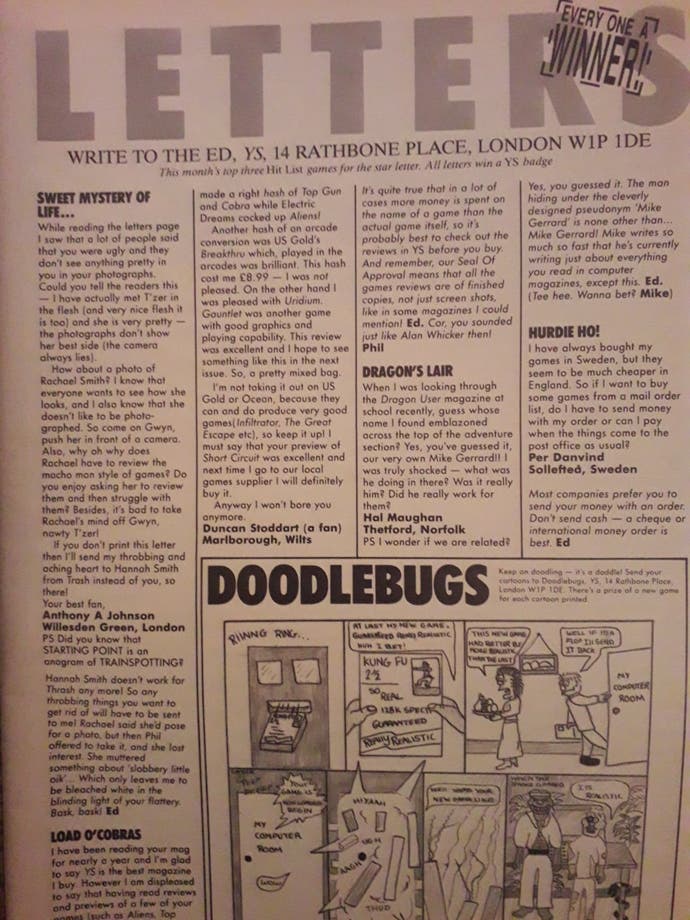
Despite his work in the reviews section, it's with the regular Crap Games Corner that Pelley is best remembered for. "I think readers just started sending games into Your Sinclair, and Matt Bielby thought it would be good to start reviewing them." In fact, the trend had been started by the barmy Duncan McDonald back in 1988 and his programming brainchild, Advanced Lawnmower Simulator. 'Published' by Gardensoft, the game was enthusiastically reviewed by its author in the April issue and touted as 'The most advanced domestic chore simulation yet to hit the home micro." A Your Sinclair Megagame award was duly granted, obviously a massive April fool joke. A few months later, it was given away on the cover of Your Sinclair, and by 1990 Pelley was inundated by clones in Crap Games Corner. Yet in reality, many of the reader games were quite impressive. "But the joke soon took over that the crapper they were, the better, so people started writing deliberately crap games."
Meanwhile, negotiations began for Bath-based Future Publishing to purchase the magazine. As Maughan tells me, Dennis Publishing never quite took video games magazines as seriously as its other lines, perhaps due to the lower advertisement revenues. By spring 1990, the sale was complete, and Your Sinclair moved west to Bath.
"When Your Sinclair first moved to Bath, they hadn't worked out how to take screenshots," says Pelley. "It was my Easter holidays, and I had the job of actually photographing the TV screens with an actual camera and Speccy, all under a blanket. That's why the screenshots in the first Future issue of Your Sinclair are so blurry."
The new opportunities that appeared at a games-focused publisher such as Future resulted in editor Bielby departing to Amiga Power in 1991; staff turnover began to increase as the Spectrum market slowly shrunk, its demographic shifting from teenagers to younger friends and siblings, donated Spectrums as their elders moved on to the Commodore Amiga or Atari ST. Yet despite the change of audience and publisher, the ethos behind Your Sinclair never changed - it was still being written with a distinctive voice, in a light-hearted tone that welcomed the reader in as part of a circle of close friends, complete with a range of zany in-jokes.
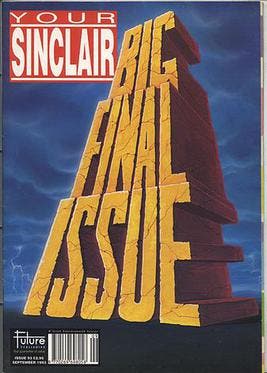
The final issue (cunningly named 'The Final Issue') was published in September 1993, and included two top 100 lists of ZX Spectrum games. As befitted the philosophy of Your Sinclair, one was compiled by contributor Stuart Campbell, with the other voted for by readers. As a tearful closing page dutifully credited everybody who had ever worked on the magazine, the jokes continued. "Is [blubbing] the Your Sinclar way? Crikey, no!" declared the final paragraph. "So get yourself a small plastic bag, fill it with water, twist the top closed, tighten and knot it. Now run outside and hurl it at the nearest body of people, shouting 'This one's for Spec-Chums everywhere!' Hurrah!"
It had been a great run, from January 1986 to September 1993, 93 issues of toilet jokes, computer games and skillo entertainment that outlasted the ZX Spectrum itself.
"We larked about so much," reflects Maughan. "But it was often hard work. I used to get in incredibly early but we rarely finished by 6. I think we were in the right place at the right time, as games were becoming less geeky and more acceptable, and Your Sinclair struck the right balance between being authoritative and irreverent. But most of all, we really did care about the readers - we thought of them all the time, and what they'd want to read."
Phil South, who has forged a successful journalism career since, nods in agreement. "We tried to make the communication with the readers as much of a two-way street as possible. If you sent us a letter, there was a scarily good chance we'd reply. If you made us laugh, we'd probably call you up and ask for more. It was that sense of community and the shared humour, much of it surreal, which made it work."
It's sometime in the late 80s. Two teenage boys are standing in WH Smith. "Oh look, Your Sinclair - that's brilliant that is!" says one to the other, completely unaware that the magazine's editor is standing behind them. "We obviously knew people were buying it from the sales figures," says Maughan. "But standing in WH Smith and hearing somebody talk about it like that was a great positive reinforcement that we were doing the right thing. I don't think we ever really appreciated how lucky we were to have such fun doing a job."
My thanks to Roger Munford, Teresa Maughan, Phil South and Rich Pelley for their contributions to this feature.
